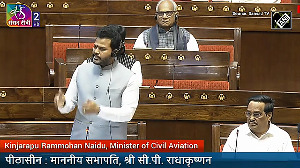'I don't care about how people are used to seeing me -- that is their problem. They make little compartments in their heads and they want to fit everybody into that, but I don't really abide by it.'
Richa Chadha, in a candid chat.
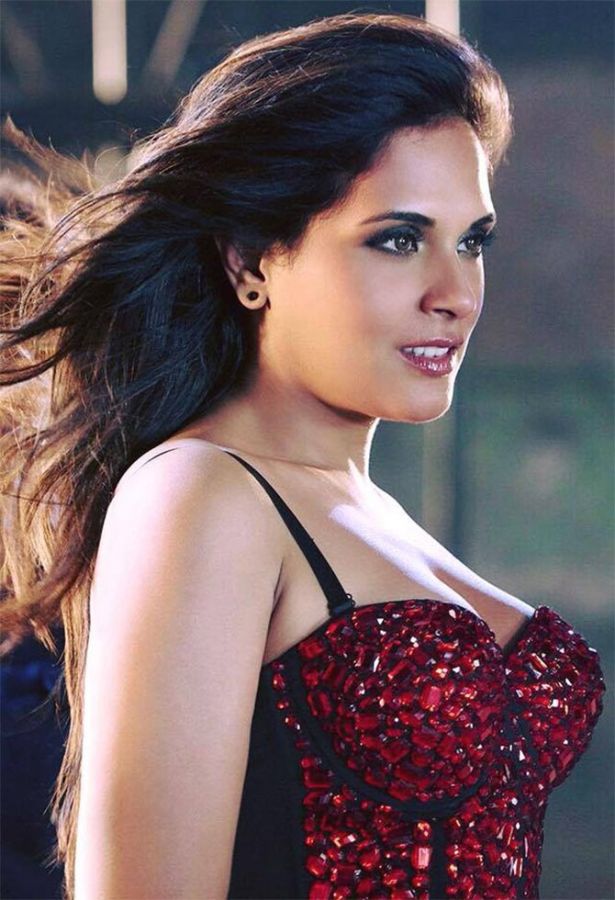
The scheduled telephonic interview with Richa Chadha began well but, within five minutes, the actress's mood changed.
Richa wasn't keen to discuss her movies ("I do interviews everyday, they don't interest me"). Instead, she wanted to talk about KETTO -- a campaign that hopes to rescue girls trapped in human trafficking and prostitution, a cause to which Richa is devoting both her time and attention.
Later though, the actress did discuss her movies and her life choices, even as she asked Rediff.com to help spread the word about the KETTO campaign.
Excerpts from her conversation with Jahnavi Patel/ Rediff.com.
You are an outsider in the film industry who made it on her own. How tough was it? Are you content with your journey so far?
I am satisfied, not content. This makes me want to work harder and get to where I want to be.
Having said that, it never really ends; the struggle continues every day. It is very difficult if you aren't from the industry.
Earlier, we just had the first generation. Now, we have grand kids and all kinds of people who are born into the industry. One has to just deal with that.
Movies where you had better roles, like Masaan, haven't been seen as much as films where your role was smaller, like Goliyon Ki Raasleela Ram-leela and Sarbjit. Do you find that unfair?
Masaan was released in a certain number of screens, so it was intended to be released on the scale that it was. It is probably the most widely watched Indian film in recent times overseas and that was the market for the film. It released in France, Germany and, later, in Italy.
We have been travelling to do promotions; last year, we went to France to promote the film after I debuted at Cannes.
I was very satisfied with the way the film was received internationally.
About Sarbjit, a large part of my role was edited out. It's up to the filmmaker. Maybe they thought that the film would be better if they shorten the length.
As for Ram-leela, I did it pretty early on in my career for the love of Bhansali (director Sanjay Leela Bhansali).
I have no regrets. I don't think it is unfair at all.
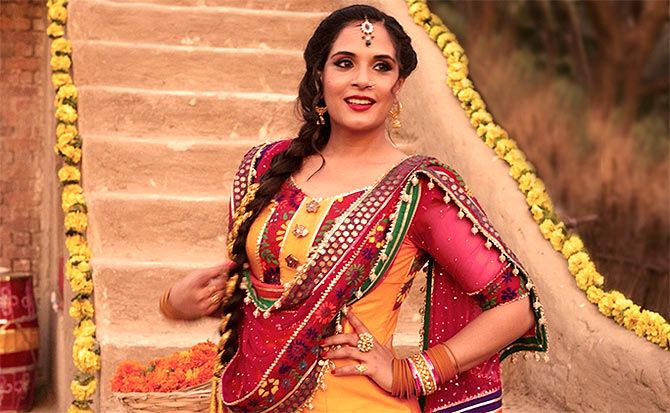
Do you think it's necessary to find a balance between commercial and art cinema for a longer career?
It depends on what you want out of your career.
There are several people who don't care about the labels of the film industry; they just want to keep working and in good films.
Actors like Sanjay Mishra, who did Masaan, is in every second film because he believes that the more he works, the better he will be as an actor. That's his approach towards his work.
There are other actors who are selective and are happy doing one or two films in two or three years.
Your films regularly travel the international film festival circuit. How are films coming out of India being viewed?
The films that go to the film festivals are very different from the films that are released in India.
In India, the Bollywood audience is the primary one. Overseas, small films like Titli and Masaan make a big impact.
Titli was actually produced by a Korean-American woman. It has been to some 15 international film festivals where films like that are appreciated and received well.
The West is just waking up to the fact that there are cinemas other than Bollywood in India.

As a celebrity, you're always under the media glare. Always judged for everything from the way you dress to the way you conduct yourself. How do you deal with the pressure?
Everyone deals with it. It's not for the people out there to judge celebrities for what they wear.
It really makes no difference to the world how somebody dresses, what they wear, how they wear it, how they look, whether they've gained or lost weight, whether they have wrinkles or stretch marks. It doesn't matter to the world in the larger scheme of things.
It's the people who react so shockingly and badly, who post negative comments on social media who should be asked why they are so jealous of people who are successful or at the top and why they are constantly trying to put them down.
It's a question society must ask itself. Actors know that they are always in the limelight and it's a tough job.
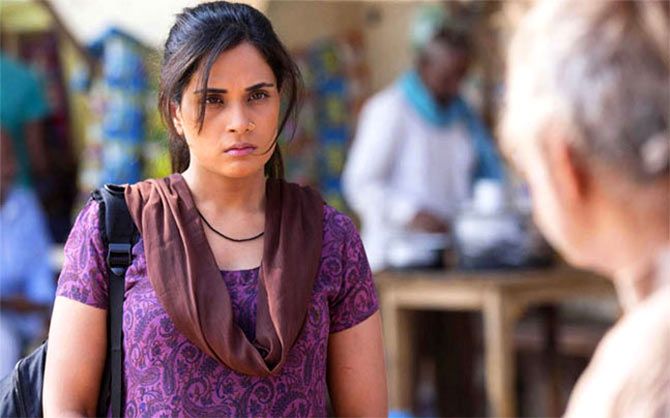
What do you consider your most challenging role?
Masaan was a difficult role because it was very restrained.
Gangs Of Wasseypur was also difficult because you had to act a certain age and play this really gavar (bumpkin) woman.
You have a wide range as an actress. Do you fear being stereotyped in the commercial Bollywood space?
How am I being stereotyped if I am doing a wide range of work?
You are experimenting with roles but in the commercial space...
(Interrupts) How am I being stereotyped if I am doing Cabaret?
In the commercial space, people are yet to experiment with you.
But Cabaret is a commercial film with nine songs. Who cast me in that? Mahesh Bhatt.
He makes commercial films, so how am I being stereotyped?
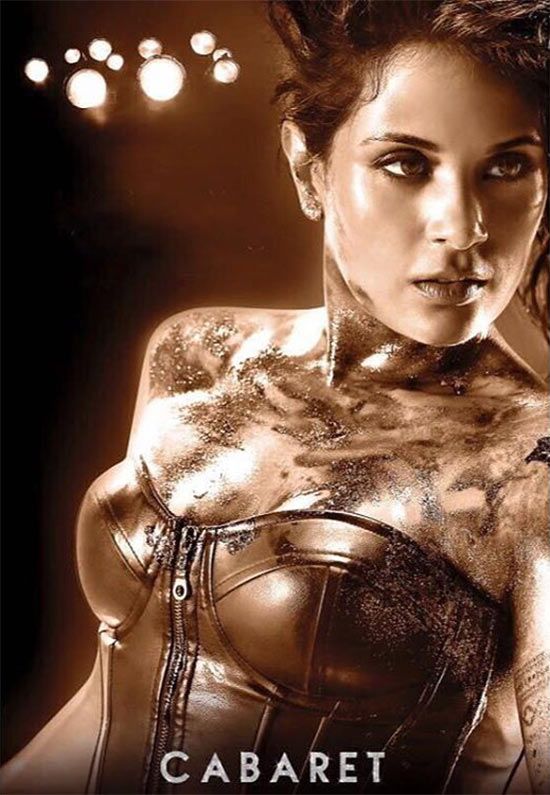
Do you challenge yourself by choosing different kinds of roles?
I just want to experiment. I just want to have a good time doing the work that I love to do. That's the only thing I think everybody should do.
Unfortunately, the industry is very stuck up and doesn't let people experiment.
Even the superstars are restricted because the audience is so hung up on seeing them in a particular way.
The press asks you dumb questions about why you took a chance. I don't really care and I like doing what I do.
You are now part of an international production. Can you tell us your experience of working in Love Sonia?
It was a great experience. I think they had me in mind when they were writing that particular character.
I am happy I am part of it because it has a great cast and story. I see big potential in this film.
Was it this dive into the horrors of sex trafficking in Love Sonia that led you to start a campaign to rescue girls trapped in trafficking and prostitution?
Actually, both things happened around the same time. I was already working on this (the campaign) before I signed Love Sonia.
I am going to reach out to the film also to see if they can, in any way, help with the campaign.
It is interesting that Freida Pinto and you -- both committed to the cause of empowering girls -- are in this film. What was it like working with her?
It was great. She's a lovely girl. She's one of the first breakout stars from India. Her story is like a dream story.
I have been to Los Angeles where I have seen that she is a well respected actor and celebrity.
I am really happy that we could collaborate on this production together.

How do you cope with failure and what keeps you motivated?
There is no failure.
I have bad days every now and then, everybody does, because you're PMSing or have a fight with your boyfriend or whatever you're going through.
You have bad days off and on but I really think there's no failure, especially in our business.
Unfortunately, our film industry is suffering at the hands of piracy. Till that stops, there's no measure of success or failure because we're losing more than three times the money to films being watched on tablets.
A film not doing well at the box office is really not the measure of anything.
Every film has its own destiny. The most well marketed films sometimes bump very badly at the box office, and then there are small films that make a wonderful noise and do well.
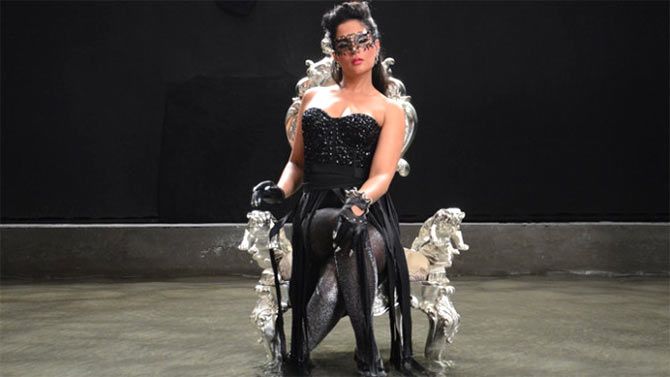
Your role in Cabaret is something not too many people would have imagined you in. Were you sceptical before taking it up?
I liked the story. Pooja (Bhatt, director) was like 'Let's experiment, let's have some fun' and I was like, okay, sure.
That's about it. That's the only thing I thought about when signing the film.
I am happy I did it. It was a challenge for me, something new and different to do.
I don't care about how people are used to seeing me -- that is their problem. They make little compartments in their heads and they want to fit everybody into that, but I don't really abide by it.
Did you take inspiration from anyone for your role in Cabaret?
No, it wasn't needed.
The story is very different from what you're imagining. If you're thinking that it's based on Helen's life or something like that, then it's not true.
It was just a nice script about a girl who is on the run and that's why I decided to do it.
I found it very different from the other scripts that I've done.
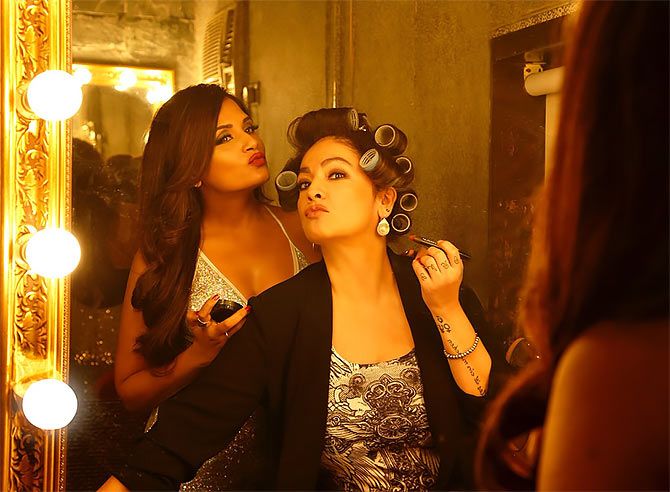
What was it like working with Pooja Bhatt? She's said to be a very strict taskmaster.
She is tough to work with because she's a perfectionist and she wants everything done properly and in her way and in time.
But I had fun and I learnt from that experience. I think I can handle a commercial film now.
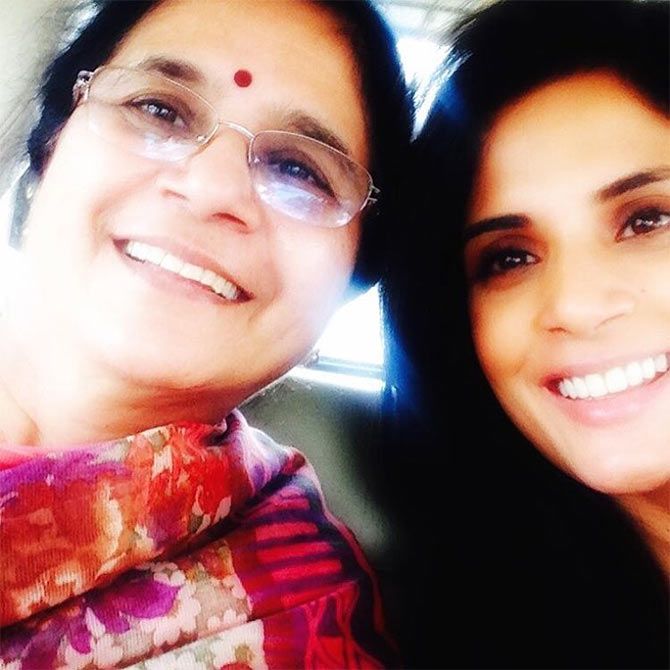
Do you discuss your work with your parents? Do they give you feedback on your roles?
Not really. I just ask them if they liked it or not and that's about it.
They aren't filmi at all.
I just tell them this film is releasing, would you like to watch it?
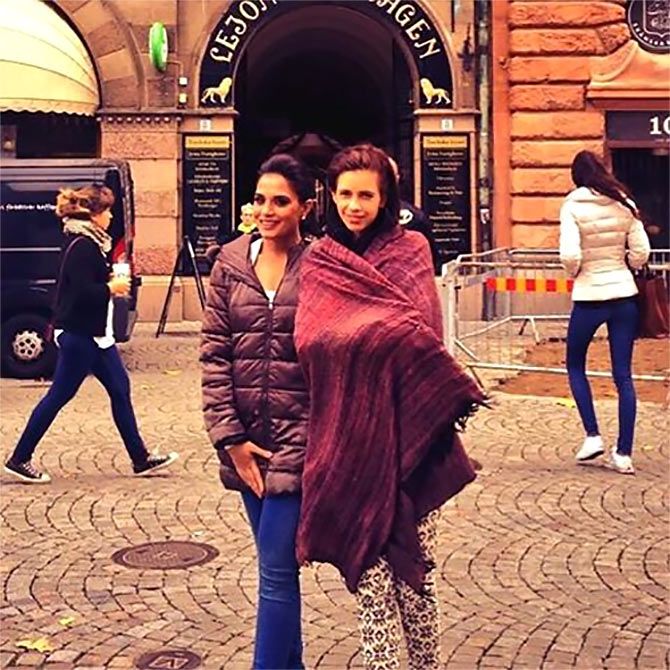
You're doing Jia And Jia with Kalki Koechlin, who is also a good friend.
We worked on the film together and became good friends.
She is a lovely girl, very hardworking, very bright. There's always a lot to learn from her.
I had great fun working with her.
Have you ever watched a film by your contemporaries and wished you were in it?
Several times. It happens when you think you can do something differently or better.
I am sure people watch my films also and think they could have done it better.
Any recent film you wish you had done?
I wish I had the opportunity to, yes, several.
I had that feeling when I watched Queen. I thought it was an interesting character to play and I wish I could have done it.
Kangana's character?
Which other character could I have played in Queen?
Even Lisa Haydon's character was good.
I am sure, but why would you think I would want to play Lisa's character and not Kangana's?
When we asked Kalki, she said she wanted to play Lisa's character.
(Interrupts) Don't ask obvious questions.
I just told you it would have been fun to play that character.

Have you ever been offered a bizarre role?
I get really ridiculous scripts every second week.
People always try to blow you away by saying we'll send the film to festivals or we'll get a good release or we're getting a good cameraman, choreographer... they try to lure you.
The industry is full of people who will lie to people to get what they want.
What do you think of the pay disparity between male and female actors?
Once again I have to answer a question I must have answered a million times but I'll do it.
Actors like Shah Rukh Khan, Aamir Khan and Salman Khan get paid what they do because they can guarantee you a certain opening.
Bollywood works like that. Which is why if Deepika (Padukone) is a huge star, at her level, she will be paid on par with her male contemporaries because she is as popular and successful.
The same goes for Kangana (Ranaut) or Anushka (Sharma) or anyone at that level.
Unfortunately, or fortunately, I am not in that league, so I don't really have to worry about pay disparity. I don't think it happens to me at any level in any case.
I think it's how popular you are, in terms of your box office opening, that decides what you get paid.
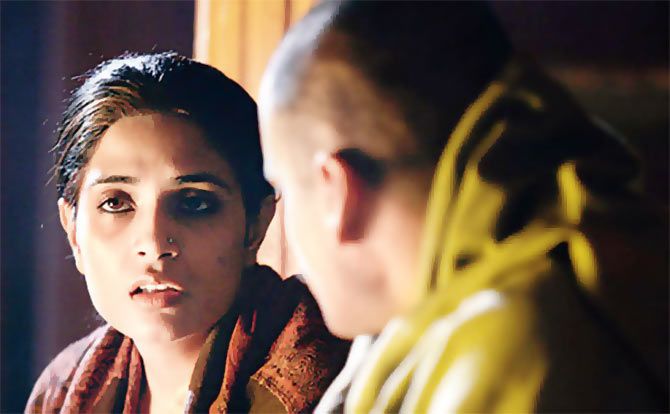
Will you still take up supporting roles?
Depends on several things.
I don't really look at roles like supporting or side or central or negative because if I did, I wouldn't have a career.
Gangs Of Wasseypur would not be an ideal launch for most people. It is because of that film that I have a career at all.
But then, actresses would not be very comfortable doing a role like Fukrey because it's a negative part.
You once said in an interview that you want to put your popularity to use and do something that you always wished for and you chose the KETTO campaign to rescue girls stuck in human trafficking and prostitution…
I have lots of things that I'd love to do. I think everybody who has some kind of power gets into causes.
Some people fight for sports and equality, some people for women's education... lots of celebrities in India do lots of good work.
I am starting with this because I think it is an urgent matter.
These girls must have a place to stay. What happened to them is not their fault -- they were abducted or taken away.
One girl was abducted and sold at the age of six. Then she was groomed till she was ready and her puberty was auctioned at 12. That's a horrifying thing for you and me to hear.
This will continue to happen unless we do something to rehabilitate them, reintegrate them into society and get them a place and a shelter where they feel safe.
They had issues trusting me to even talk to them because whoever they've met and trusted has stabbed them in the back.
How are you going about the campaign?
There are four girls living in the shelter.
I know 12 more girls who want to leave the sex trade and stay there but the current accommodation is not enough.
That is why we started the campaign so that they could live in a better place where they would feel safe and we could allot somebody for their security. A place where they can have dance lessons and embroidery lessons, so that they are trained.
That is why this campaign was started -- to accommodate a higher number of girls.










